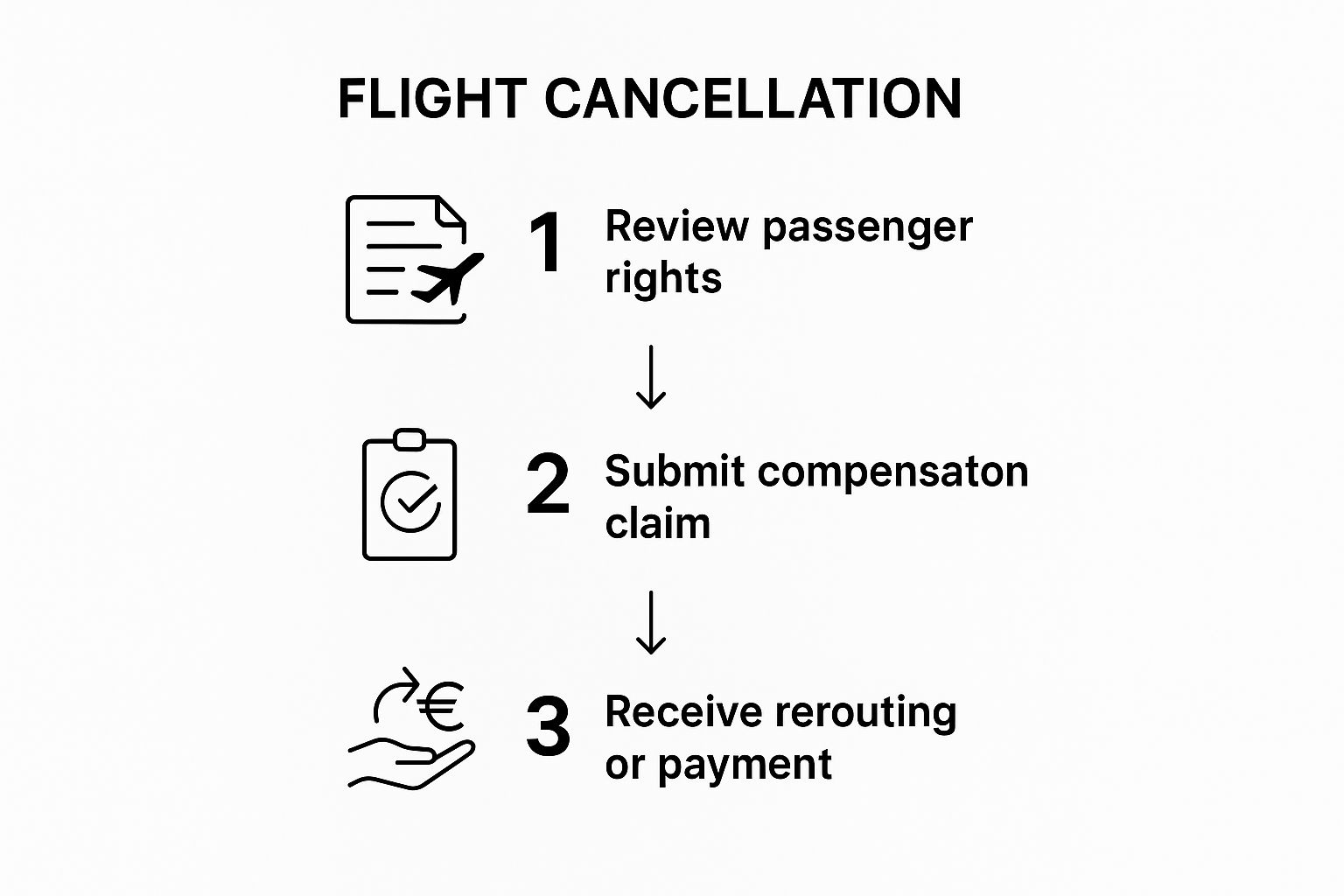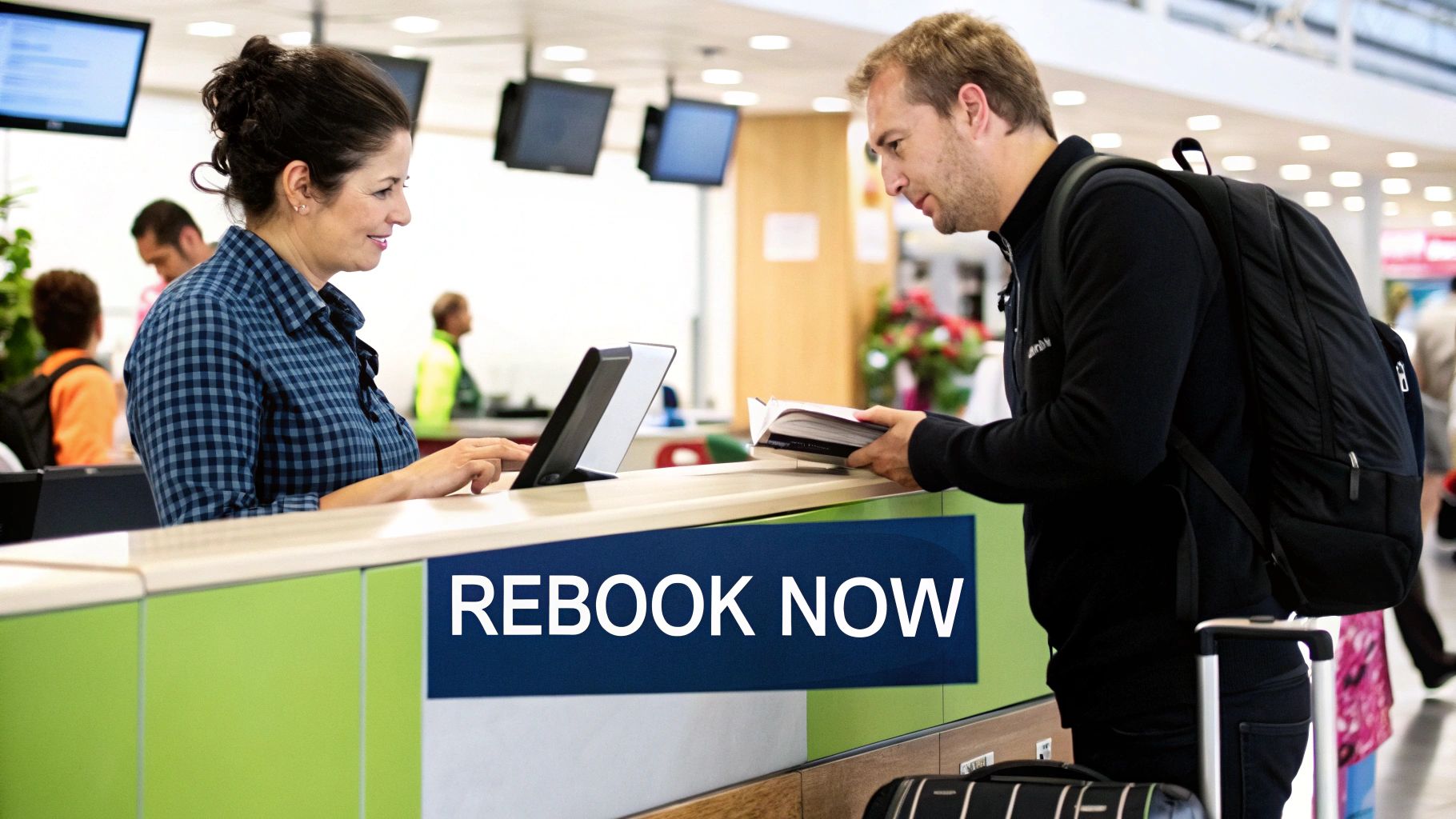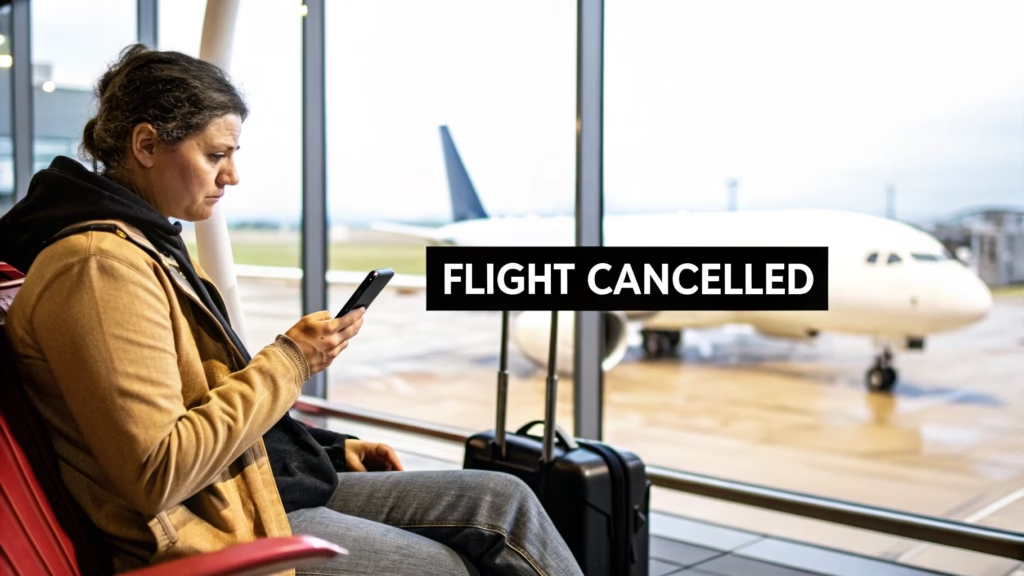Last Updated on
Understanding Your Rights When Airlines Cancel Flights
Airlines don’t always make it easy to get the compensation you deserve when your flight is cancelled. Knowing your rights can transform you from a frustrated passenger into an empowered advocate. This means understanding what protections are available in different regions and under various circumstances.
Key Differences in Passenger Rights
Passenger rights differ significantly around the world. In the US, the Department of Transportation (DOT) requires airlines to provide timely notice, refund options, and sometimes meals or hotel accommodations, depending on how long the delay is. The European Union’s EC 261/2004 also offers strong protections, but many passengers aren’t aware of them. This lack of awareness can be costly, leading travelers to miss out on potential compensation.
Before even thinking about potential cancellations, it’s wise to minimize your initial costs. Check out this article on snagging a great deal on flights to Vegas. Saving money upfront can provide a cushion for unexpected expenses if a cancellation occurs.
Understanding US Regulations and Global Protections
The Bureau of Transportation Statistics (BTS) tracks US flight cancellations and delays, offering valuable data on operational issues. The BTS defines a flight as delayed if it arrives or departs more than 15 minutes after its scheduled time—a much more frequent occurrence than outright cancellations. In one reporting period, the US saw nearly 140,000 cancellations out of over 5 million flights, while delays impacted hundreds of thousands more.
When a flight is cancelled, US regulations require airlines to offer specific remedies. Similar protections exist globally, such as those in Europe under EC 261/2004. Knowing airline policies, your rights, and documenting all communication are crucial steps. You can find more detailed statistics here.

Taking Proactive Steps
Understanding these basics is essential to getting the benefits you are entitled to. This includes knowing the difference between “cancelled” and “delayed,” as this distinction can affect your claim. Also, be aware of the specific documentation you need.
- Keep records of your booking confirmation
- Save all communication with the airline
- Keep receipts for any expenses due to the cancellation
Taking these proactive steps significantly increases your chances of receiving the compensation you deserve. These insights empower you to manage flight disruptions effectively and minimize their impact on your travels.
Immediate Steps To Take At The Airport
When your flight gets cancelled, the first hour is crucial. Your actions in this timeframe can significantly impact the rest of your travel experience. Instead of immediately confronting the gate agent, consider these more effective strategies.
Simultaneous Action: Phone and In-Person
Don’t just stand in line. While waiting to speak with a gate agent, call the airline’s customer service. This simultaneous approach can often lead to a faster resolution. Agents on the phone sometimes have access to different seat inventory or can process rebooking requests more quickly.
- Call the Airline: Immediately call the airline’s customer service number. Have your confirmation number and flight details readily available.
- Join the Line: At the same time, get in line to speak with a gate agent. Pursuing both avenues increases your chances of a quick solution.

This infographic illustrates the steps to take after a flight cancellation. It visually emphasizes understanding your rights, filing a compensation claim, and ultimately securing a rerouted flight or a refund.
Leverage Technology and Documentation
Airline apps, like the American Airlines app can often provide faster rebooking options than waiting for a gate agent. Having your important documents ready can also help expedite the process. You might also want to read up on how to stay connected while traveling abroad.
- Use the App: Check the airline’s app for rebooking options while you’re on hold or in line.
- Prepare Documentation: Have your booking confirmation, identification, and any relevant travel documents readily available.
Strategic Questions for Airline Staff
Asking specific, solution-oriented questions can get you better results. For instance, ask about flights on partner airlines or alternative airports. This proactive problem-solving demonstrates initiative and often leads to more helpful responses from busy airline staff.
To help you stay organized during this crucial first hour, here’s a handy checklist:
Immediate Action Checklist: First 60 Minutes After Cancellation
Step-by-step timeline showing priority actions to maximize rebooking success
| Time Frame | Action | Why It Matters | Backup Plan |
|---|---|---|---|
| 0-5 Minutes | Call the airline’s customer service line. | Starts the rebooking process immediately. | Use the airline’s app. |
| 0-5 Minutes | Join the line to speak with a gate agent. | Provides a second avenue for rebooking. | Look for a customer service desk. |
| 5-15 Minutes | Check the airline’s app for rebooking options. | Often faster than phone or in-person. | Continue with phone and in-person efforts. |
| 15-30 Minutes | Ask the agent (phone or in-person) about partner airline options. | Expands rebooking possibilities. | Research partner airlines yourself. |
| 30-45 Minutes | Inquire about alternative airports. | Might offer sooner flights. | Use a flight search engine to check nearby airports. |
| 45-60 Minutes | Review available options and make a decision. | Avoids further delays. | Ask the agent for recommendations. |
This checklist prioritizes immediate actions to increase your chances of a smooth rebooking. By following these steps, you can regain control of your travel plans and minimize disruptions.
How Global Cancellation Patterns Shape Your Strategy
Not all flight routes are created equal. Experienced travelers know that flight reliability differs significantly worldwide and consider this when planning. This means thinking about not only the airline but also the specific route, the time of year, and even the airports involved.
Seasonal Variations and Regional Performance
Just as weather changes throughout the year, so do flight cancellation rates. Some areas experience more cancellations during particular seasons. For instance, hurricane season in the Caribbean can cause increased disruptions. Political instability or major events in specific countries can also affect flights. Understanding these trends can help you anticipate potential issues and adjust your travel plans.
Airport-Specific Challenges and Bottlenecks
Some airports are simply more prone to delays and cancellations than others. Factors like air traffic congestion, limited runway capacity, or frequent bad weather can contribute to this. Airports in mountainous regions, for example, might be more susceptible to fog or snow delays. Knowing which airports statistically experience more disruptions allows you to consider alternative routes or add buffer time.
An analysis of 2024 data by TravelPerk revealed that flight cancellation rates across major markets between March and September ranged from 1.5% to 3.2%. However, some countries had significantly higher rates. China and Canada saw cancellation rates of around 5% and 3.4%, respectively. Meanwhile, Spain and India maintained some of the lowest rates at approximately 0.8% and 1.1% during the same period. Even in the US, a major aviation market, about 140,000 flights out of over 5 million were canceled, a 2.76% cancellation rate. Find more detailed statistics here.
Adapting Your Booking Strategy
Understanding global cancellation patterns helps travelers make smarter choices. This might involve selecting airlines with better track records on specific routes or opting for flights at less congested times.
- Consider alternative routes: If a direct flight has a high cancellation rate, explore connecting flights through more reliable airports.
- Use airline apps: Real-time updates through airline apps can be crucial for managing disruptions and finding alternative arrangements quickly. For staying connected and informed, check out these helpful travel apps.
- Travel Insurance: Investing in comprehensive travel insurance offers financial protection if cancellations occur, covering rebooking fees, accommodation, and other lost expenses.

By analyzing these patterns and incorporating them into your travel planning, you can minimize the impact of flight cancellations and create a smoother, more predictable trip. This proactive approach allows you to travel with more confidence, knowing you’re prepared for the unexpected.
Securing Alternative Travel Arrangements That Actually Work
When your flight is canceled, securing alternative travel arrangements quickly and effectively becomes paramount. This involves more than just waiting in line at the customer service desk. It requires a proactive, multi-pronged approach.
Identifying Partner Airlines and Codeshare Agreements
Many airlines have partner airlines or codeshare agreements. This means they can book you on flights operated by other carriers, opening up alternative routes that might not be immediately obvious. Don’t hesitate to ask the airline representative about these possibilities. For example, if your flight with Airline A is canceled, they might be able to book you on a flight with their partner, Airline B, getting you to your destination, even if the route is different.
Strategic Flexibility: Layovers vs. Direct Flights
Sometimes, accepting a longer layover is the quickest way to reach your destination. While a direct flight might seem ideal, a connecting flight, even with a layover, might be your best option if the direct flight is fully booked. Strategic flexibility is essential in these situations. This means carefully considering the advantages and disadvantages of different options and choosing the one that gets you where you need to go as soon as possible. You might be interested in: Car rental tips while traveling abroad.
Multi-City Booking and Standby Strategies
Multi-city booking, though often used for complex itineraries, can also be a helpful strategy during cancellations. By dividing your journey into smaller segments, you create alternative routes to your final destination. This can be especially useful if a particular leg of your original itinerary is repeatedly delayed or canceled. Understanding how standby lists work is also beneficial. Politely inquiring about standby options and explaining your situation to airline staff can sometimes improve your position on the list.
Leveraging Airline Operations Insights
Understanding how airlines prioritize rebooking during irregular operations can give you an advantage. Airlines often prioritize minimizing overall network disruption. This means passengers on connecting flights might get priority over those on direct flights if rebooking them resolves multiple routing issues. Knowing this allows you to tailor your requests and questions to align with the airline’s priorities, improving your chances of a positive outcome. According to Cirium’s April 2025 Global On-Time Performance Report, global flight cancellations decreased by 24% compared to the previous month, dropping from 46,486 in March to 35,333 in April 2025. While this shows improvement, tens of thousands of flights are still canceled each month. This reinforces the importance of passengers being well-informed and proactive.

By understanding these advanced rebooking strategies, you become an active participant in finding solutions, rather than passively accepting airline decisions. This empowers you to reach your destination efficiently, even when facing a canceled flight.
Maximizing Compensation And Benefits Beyond Basic Rebooking
Airline cancellations are frustrating. Often, airlines offer only the minimum — a rebooked flight. But you might be entitled to much more if you understand your rights and advocate for yourself. Knowing the difference between voluntary and involuntary cancellations is the first step.
Voluntary vs. Involuntary Cancellations: Understanding Your Rights
A voluntary cancellation is when you, the passenger, decide to cancel. An involuntary cancellation is when the airline cancels due to reasons outside your control, like mechanical problems, air traffic control issues, or weather. This distinction matters because it impacts the compensation you can receive. If the airline cancels your flight due to a mechanical issue, you might be entitled to meal vouchers, hotel accommodations, and potentially even cash compensation depending on the delay and regulations.
Navigating Weather-Related Delays
Weather delays are tricky. Airlines aren’t typically liable for compensation when truly unavoidable weather disrupts travel. However, sometimes operational issues contribute to what’s labeled a “weather delay.” Imagine multiple flights canceled due to a minor storm. This could indicate underlying staffing shortages or scheduling problems that worsen the weather’s impact. In these situations, persistence can sometimes lead to additional benefits. For tips on staying secure during travel disruptions, check out this helpful resource: 7 tips for better cybersecurity during travel.
Documentation: Your Best Tool for Compensation Claims
Meticulous record-keeping from the moment a cancellation is announced is crucial for a successful claim. Document every detail of the disruption.
- Communication Records: Save all emails, text messages, and any other correspondence with the airline.
- Travel Documents: Hold onto your boarding passes and baggage tags as proof of your original flight.
- Expense Receipts: Keep receipts for meals, transportation, and accommodation costs incurred due to the cancellation.
This documentation strengthens your claim and proves the extent of the disruption. Remember to familiarize yourself with the specific regulations applicable to your flight, as they differ depending on the origin, destination, and airline.
Effective Communication and Escalation Strategies
If your initial claim is rejected, don’t give up. Persistence is key. Escalate your claim within the airline’s customer service department or contact the appropriate regulatory bodies.
- Clarity and Conciseness: Use clear, concise language, focusing on the facts of the cancellation and your entitlements. Avoid emotional pleas.
- Supporting Documents: Provide copies of all supporting documents to validate your claim and simplify processing.
- Regular Follow-Up: Don’t let your claim be forgotten. Regular follow-up demonstrates your commitment to receiving compensation.
To understand the potential compensation based on your region and specific circumstances, refer to the table below.
The following table provides a comprehensive breakdown of what airlines might be required to provide based on your location and the nature of the cancellation.
Compensation Entitlements By Region And Circumstances
Comprehensive breakdown of what airlines must provide based on location and cancellation type
| Region | Flight Distance | Compensation Amount | Additional Benefits | Required Conditions |
|---|---|---|---|---|
| European Union | < 1,500 km | €250 | Meals, accommodation | Involuntary cancellation, less than 14 days’ notice |
| European Union | 1,500 – 3,500 km | €400 | Meals, accommodation | Involuntary cancellation, less than 14 days’ notice |
| European Union | > 3,500 km | €600 | Meals, accommodation | Involuntary cancellation, less than 14 days’ notice |
| United States | Varies | Varies (refund may be required) | Meals, accommodation (sometimes) | Depends on the airline’s contract of carriage and circumstances |
This table outlines some potential entitlements; however, regulations can be complex and vary. Always check the specific rules applicable to your situation.
By knowing your rights and communicating effectively, you can significantly improve your chances of receiving the compensation and benefits you deserve, turning a frustrating travel disruption into an opportunity to reclaim control and secure what you’re owed.
Prevention And Smart Travel Planning For Future Trips
The best way to handle flight cancellations is to avoid them altogether. While a perfect strategy doesn’t exist, proactive planning can significantly lessen the chances of disruptions. This means looking beyond basic on-time performance and truly understanding the travel industry’s inner workings.
Identifying Reliable Flights and Optimal Booking Times
Finding the right flight involves more than just scoring the cheapest deal. Consider factors like the airline’s on-time performance history for the specific route and the time of year. Flights during peak seasons or to destinations known for weather issues are statistically more likely to be cancelled. Booking during off-peak times often provides more flexibility and lower fares. This can also reduce the chance of being stranded during a mass cancellation.
Booking timing is also crucial. Booking too far in advance might mean missing potential price drops, while booking too close to your departure limits your options if a cancellation occurs. Finding the sweet spot, usually a few weeks to a couple of months out, allows for flexibility without the premium price tag.
Travel Insurance: Real Value When You Need It Most
Travel insurance isn’t just for medical emergencies. Comprehensive travel disruption insurance can reimburse non-refundable expenses like flights, accommodations, and pre-paid activities if your flight is cancelled for covered reasons. Before your next trip, review your insurance options. Consider supplemental coverage, such as car shipping insurance.
Make sure your policy covers cancellations due to weather, mechanical problems, or even strikes. Understand the coverage limits and exclusions in the fine print. This knowledge will help you choose a policy that truly protects your specific needs.
Airport Selection and Fare Class Benefits
Consider an airport’s historical performance data. Some airports are more prone to delays and cancellations due to weather patterns or air traffic congestion. Choosing an airport with a better track record can improve your odds of a smoother trip.
Your chosen fare class can also impact your options during cancellations. While pricier fares often offer more flexibility, certain lower fare classes on some airlines might have surprisingly good rebooking options during irregular operations. Research each airline’s policies regarding different fare classes and weigh the potential benefits against the cost difference.
Technology Tools and Redundancy Planning
Several flight tracking apps provide real-time updates on flight status, including delay or cancellation notifications. These early warnings give you a head start in making alternative arrangements. For some additional travel advice, see our guide on Ultimate travel tips for solo travelers in Italy.
Seasoned travelers often build redundancy into their itinerary. This could involve booking backup flights on different airlines or having alternative transportation options. Having a Plan B reduces stress and allows for a quick response if your original flight is cancelled. This proactive approach offers a sense of control and minimizes disruption. For important trips, consider arriving a day or two early to mitigate the risk of missing crucial events.
Decision-Making Criteria for Minimizing Cancellation Impact
When facing a potential cancellation, consider these factors:
- Trip Importance: Is it leisure or a critical business meeting? The trip’s importance should determine your risk tolerance for connecting flights or alternative routes.
- Time Sensitivity: How quickly must you arrive? This determines your flexibility with layovers or alternative travel arrangements.
- Budget: How much can you spend on alternative transport or accommodation? Knowing your budget helps you make informed rebooking decisions.
By incorporating these criteria into your planning, you’ll create a travel strategy that’s more efficient and resilient to disruptions. This means traveling with more confidence, knowing you have a plan for unexpected cancellations.

Hi there! My name is Jenny, and I’m a travel writer who is endlessly curious about the world and always on the hunt for the next best-kept travel secret. My expertise lies in creating destination guides that enable you to travel smarter and especially if you travel solo.
My bylines have appeared on blogs, travel sites, and content agencies, and I’m always ready for the next adventure (and next great caffeine fix). In between assignments, you can find me trawling through a bazaar, sampling street food, or getting lost in an unfamiliar metropolis by choice.

